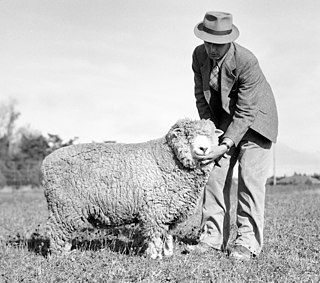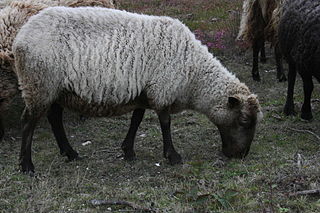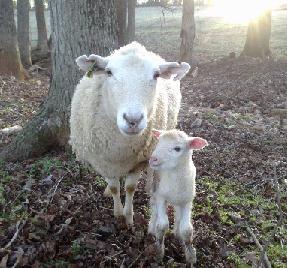Manx is an adjective describing things or people related to the Isle of Man:

The Border Leicester is a British breed of sheep. It is a polled, long-wool sheep and is considered a dual-purpose breed as it is reared both for meat and for wool. The sheep are large but docile. They have been exported to other sheep-producing regions, including Australia and the United States.

The Jacob is a British breed of domestic sheep. It combines two characteristics unusual in sheep: it is piebald—dark-coloured with areas of white wool—and it is often polycerate or multi-horned. It most commonly has four horns. The origin of the breed is not known; broken-coloured polycerate sheep were present in England by the middle of the seventeenth century, and were widespread a century later. A breed society was formed in 1969, and a flock book was published from 1972.

The Ryeland is one of the oldest English sheep breeds going back seven centuries when the monks of Leominster in Herefordshire bred sheep and grazed them on the rye pastures, giving them their name. It was introduced into Australia in 1919 and are classified as an endangered breed by the Rare Breeds Trust of Australia and also are one of the nine heritage breeds that were the foundation of the sheep and wool industry in Australia. The Ryeland was one of the breeds used to introduce the poll gene to the Dorset breed in the development of the Poll Dorset. This breed is raised primarily for meat.

The Suffolk is a British breed of domestic sheep. It originated in the late eighteenth century in the area of Bury St. Edmunds in Suffolk, as a result of cross-breeding when Norfolk Horn ewes were put to improved Southdown rams. It is a polled, black-faced breed, and is raised primarily for its meat. It has been exported to many countries, and is among the most numerous breeds of sheep worldwide.

The Corriedale is a New Zealand breed of sheep. It was bred from about 1882 in the South Island by James Little, who cross-bred Merino and Lincoln Longwool sheep. The breed was officially recognised in 1911. It has been exported to Australia and to many countries in Africa, Asia, Europe and North and South America. In 2021 it was reported from twenty-five countries, and the total population was estimated at just over 5 million.

Polled livestock are livestock without horns in species which are normally horned. The term refers to both breeds and strains that are naturally polled through selective breeding and also to naturally horned animals that have been disbudded. Natural polling occurs in cattle, yaks, water buffalo, and goats, and in these animals it affects both sexes equally; in sheep, by contrast, both sexes may be horned, both polled, or only the females polled. The history of breeding polled livestock starts about 6000 years BC.

The Dorset Horn is an endangered British breed of domestic sheep. It is documented from the seventeenth century, and is highly prolific, sometimes producing two lambing seasons per year. Among British sheep, it is the only breed capable of breeding throughout the winter.

The Shetland is a small, wool-producing breed of sheep originating in the Shetland Isles, Scotland, but is now also kept in many other parts of the world. It is part of the Northern European short-tailed sheep group, and it is closely related to the extinct Scottish Dunface. Shetlands are classified as a landrace or "unimproved" breed. This breed is kept for its very fine wool, for meat, and for conservation grazing.

The Portland is a sheep breed that takes its name from the Isle of Portland in Dorset, England. This breed is raised primarily for meat.

The Coolalee is an Australian short wool, meat sheep breed, developed from an eight-year breeding program commenced in 1968. The breed resulted from the crossing of the Wiltshire Horn, Suffolk, Hampshire Down, Poll Dorset, Lincoln and English Leicester sheep breeds.

The Poll Dorset, a short-wool, meat-producing sheep, was developed in Australia between 1937 and 1954 with the aim of breeding a true Dorset type sheep without horns. The poll gene was introduced into Dorset Horn flocks from two other polled breeds and following a strict back-mating programme achieved close to 100% of Dorset Horn blood. Its main distinguishing features are its hornless appearance, long, lean square body set on short legs, pink skin and 'spongy' short-stapled wool. The Poll Dorset produces a fleece of white, dense downs type wool of 30 microns fibre diameter and it has a white wool-free face. The breed was developed at a property called Valmore in Whitemore, Tasmania, a noted centre for pedigree livestock stud farms. The Poll Dorset resulted from the introduction of Corriedale and Ryeland blood into the Dorset Horn.
A landrace is a type of domestic animal or plant adapted to the natural and cultural environment in which it originated, with minimal selective breeding. Some have "landrace" in the names:

The Northern European short-tailed sheep are a group of traditional sheep breeds or types found in Northern Europe, mainly in the British Isles, Scandinavia, Greenland and the area around the Baltic. They are thought to be derived from the first sheep brought to Europe by early farmers, and for thousands of years they were the only type of sheep kept in Northern Europe. They are hardy sheep, adapted to harsh environments, but they are small and have been replaced in most areas with later types of larger, long-tailed sheep.
The British Milksheep is a robust, dual-purpose sheep commonly known for its milking characteristics.

The Wiltipoll is a breed of polled domestic sheep that was developed in Australia from Wiltshire Horn sheep with the infusion of Border Leicester, Perendale, Poll Dorset, and Poll Merino genetics, that are raised for meat.

The Newfoundland, also called the Newfoundland Local, is a breed of sheep native to Newfoundland.
An ornamental animal is an animal kept for display or curiosity, often in a park. A wide range of mammals, birds and fish have been kept as ornamental animals. Ornamental animals have often formed the basis of introduced populations, sometimes with negative ecological effects, but a history of being kept as ornamental animals has also preserved breeds, types and even species which have become rare or extinct elsewhere.

The Australian White is an Australian breed of meat sheep. It derives from selective breeding of White Dorper, Van Rooy, Poll Dorset and Texel sheep, with the aim of creating a large white sheep suited to Australian conditions, and with a self-shedding hair coat.

The Polled Dorset is an American breed of domestic sheep. It is a polled (hornless) variant of the British Dorset Horn. It was developed at the North Carolina State University Small Ruminant Unit in the 1950s after a genetic mutation led to the birth of a polled ram. After some years of breeding work, a true-breeding polled strain was established.















